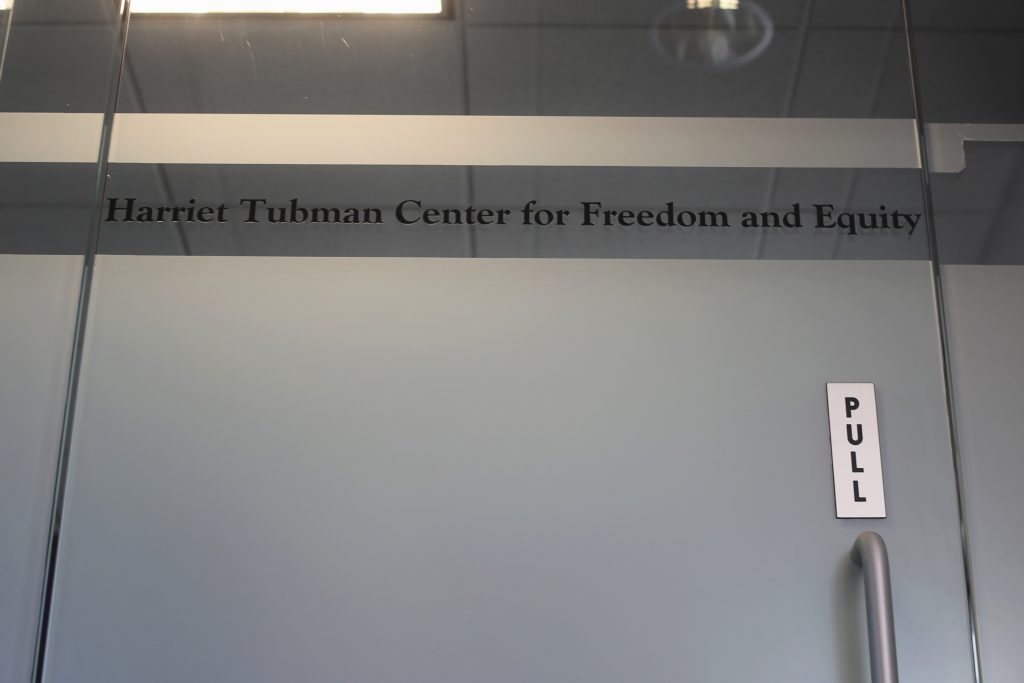The Harriet Tubman Center for the Study of Freedom and Equity officially opened its doors to Binghamton University faculty and students, establishing a new, unique space in an effort to enhance diversity on campus.
The Tubman Center focuses on conducting research, writing and programs with three primary goals — public history and equity, educational equity and equity in the medicine/STEM fields. As a research center focused on freedom and equity, the Tubman Center works to connect the history of slavery and abolition to modern-day public policy.
“The legacy of slavery and the unfinished business of freedom still looms large in today’s society,” the Tubman Center wrote on its website. ”The need for equity is still a pressing issue as disparities in education, employment and health care abound. Our view is that there is no straight line from the past to the present, but there is a legacy, and patterns and cycles of behavior and thought over time should be addressed. It is for this reason that a center that focuses on freedom and equity is timely and necessary.”
Sharon Bryant, director of diversity, equity and inclusion at Decker College of Nursing and Health Sciences, expressed that the opening of the new physical space for the Tubman Center in Academic Building B marks an exciting change.
“We’ve had academic spaces where faculty and students can affiliate and take classes — there’s the Africana studies department [and] the [women, gender and sexuality studies] department,” Bryant said. “But we have not had a center where people could come together whose research focuses on equity issues, issues around freedom and diversity. And so, having a physical space permits people to come find collaboration and like-people who are conducting similar research.”
In the past, the Tubman Center has worked on initiatives aimed toward identifying policies and practices that bring about positive change to the campus on the issue of race and ethnicity. At the end of the spring 2021 semester, the Tubman Center concluded its Truth and Reconciliation Commission (TRC) panel series, a collaborative project between the Tubman Center and BU President Harvey Stenger, in which students and faculty were given the opportunity to speak on their experiences while encouraging the University to provide solutions regarding racism and diversity issues on campus.
Bryant says the Tubman Center intends on expanding upon the TRC project by considering the panel’s recommendations toward reparations and other potential initiatives for greater diversity and inclusion on campus.
“We want to do an inventory on campus examining anything that individuals may find offensive on campus,” Bryant said. “We plan to do a walk-through inventory building by building, looking at hallways and common spaces. We want to inventory how diverse the images on campus are to see if we could do a better job of representing all the diversity that is on our campus.”
Bryant said areas of particular interest are acknowledging Native American land, given a large number of buildings with Native American names on campus, and parts of the Underground Railroad on which BU has been established. Bryant also hopes to have some sort of remembrance for the Tubman Center, potentially creating a statue in honor of Harriet Tubman herself.
Aidan Crowley, an undeclared freshman, expressed enthusiasm toward the Tubman Center’s grand opening.
“I think they have cool initiatives,” Crowley said. “I think it’s really important that they are doing all this research and all these projects to figure out the issues that minorities face and what the solutions can be directly on campus. As a freshman, it’s especially exciting because I think the [Tubman Center] has a lot of potential for my next four years.”
Following the opening of the Tubman Center’s physical office, Bryant offered advice as to how students can get involved.
“If anyone is conducting research in our topics of interest, they are welcome to reach out to us,” Bryant said. “If they are interested in serving on one of our committees, such as the committee in which we are going around and looking at the physical buildings on campus, or if you want to attain any of our public education programs or partner with us on bringing a speaker in, we are open to it.”



